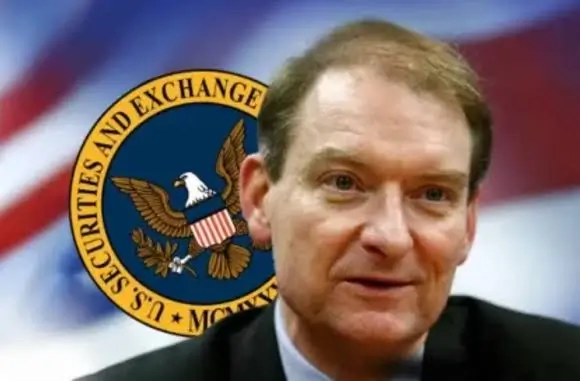Washington, D.C. — June 2025
Former U.S. Securities and Exchange Commissioner Paul Atkins has renewed calls for rational crypto regulation in the United States, highlighting the urgent need for transparency and modern legal frameworks. As crypto adoption accelerates and the global market matures, Atkins is positioning himself as a leading voice advocating for reform within the SEC.
His call aligns with growing discontent among blockchain startups, investors, and policymakers, all of whom argue that the current regulatory environment hampers growth and innovation.

Paul Atkins backs clear crypto rules to guide SEC policy ( Image Source: HOKANEWS.COM )
A Reasoned Push for Regulatory Reform
Currently serving as CEO of Patomak Global Partners, Paul Atkins brings deep insight into regulatory governance. He argues that the SEC’s decades-old approach is unfit for a digital economy driven by decentralised technologies. “We need a rules-based system that protects investors without smothering innovation,” Atkins stated.
His approach doesn’t call for deregulation, but rather modernisation — regulations that are proactive, transparent, and suitable for digital assets. Atkins champions a structure where rules are clearly communicated, giving developers and financial institutions a fair shot at compliance.
Outdated Laws, Mounting Frustration
Crypto enterprises operating in the U.S. often find themselves navigating a confusing legal landscape. Many say the SEC relies too heavily on enforcement actions instead of offering clear guidelines. This lack of clarity has forced some companies to freeze operations, relocate offshore, or face unexpected lawsuits.
#BREAKING: SEC Chair Paul Atkins announces a “new day” for crypto regulation, emphasizing clear rules over enforcement actions to foster innovation.
SOURCE: Decrypt pic.twitter.com/Sg53QyLtyB
— Qatalog (@qtlgfinance) June 4, 2025
Meanwhile, countries like Australia, the UK, and Singapore are adopting flexible, innovation-friendly crypto policies — a sharp contrast to the uncertainty within the U.S. system. Atkins warns that without timely reform, America could lose its edge in the global digital economy.
More Than Words — A Practical Blueprint
Atkins’ advocacy isn’t just rhetorical. Through his firm, he works closely with financial firms and blockchain ventures to navigate the evolving legal space. His recommendations include:
- Explicit classification of digital tokens
- Compliance frameworks for wallets and exchanges
- Collaborative engagement between regulators and innovators
- Predictable enforcement practices rooted in rule clarity
His approach is grounded in practicality. Atkins believes that building regulatory structures around clear rules will foster long-term trust and unlock investment.
The Crypto Sector Wants Clarity, Not Loopholes
It’s not that the crypto industry opposes regulation — quite the opposite. Developers and investors are calling for predictability. Without clear definitions or a consistent oversight process, businesses operate in a constant state of uncertainty.
Also Read: 21Shares Unveils 3-for-1 Bitcoin ETF Share Split, Widening Access to Crypto Investment in 2025
Atkins highlights this reality: “If rules are unclear, progress halts. Businesses can’t thrive if they fear regulation might shift overnight.” This uncertainty deters new entrants, discourages innovation, and ultimately harms retail investors.
Global Competitors Are Catching Up
An increasing number of blockchain firms have already migrated operations overseas, citing regulatory clarity as a top reason. These firms are investing in jurisdictions that welcome innovation while offering legal certainty.
This trend concerns Atkins and other industry leaders, who argue that the U.S. still has a chance to reclaim its leadership in digital finance. But time is running out. Without reforms, capital and talent will continue to flow elsewhere.
Reforming the SEC’s 20th-Century Approach
Atkins believes the SEC’s regulatory model — rooted in 1930s securities laws — simply cannot keep pace with the decentralised, real-time nature of blockchain technology. “Applying 90-year-old rules to blockchain is like using a horse-drawn carriage on a motorway,” he quipped during a recent interview.
His proposed model urges for collaborative governance — where regulators and innovators co-develop smart, adaptive rules that uphold integrity without blocking progress. This would also reduce regulatory uncertainty and enforcement shocks, which currently discourage institutional adoption.
Bipartisan Momentum Builds in Congress
Atkins’ stance is gaining political momentum. Lawmakers on both sides of the aisle have introduced draft bills aimed at clarifying digital asset categories, assigning jurisdiction between federal agencies, and protecting compliant companies from punitive action.
Public interest is rising too. With millions of Americans now owning crypto assets or using blockchain platforms, the demand for strong but fair legislation is at an all-time high.
A Turning Point for U.S. Crypto Policy
Atkins’ advocacy signals a pivotal shift in the U.S. crypto narrative. Rather than treating digital assets as regulatory anomalies, he positions them as core components of modern finance. His efforts underscore a vision where compliance and innovation can coexist.
For developers, clear rules would foster confidence to build in the U.S. For investors, it would ensure better protection. And for institutions, it opens the door to more strategic, risk-managed crypto engagement.
Final Thoughts: The Clock Is Ticking
Paul Atkins’ push for sensible, transparent regulation is more than just a policy statement — it’s a call to action. As crypto weaves itself deeper into global economic infrastructure, the cost of regulatory delay grows higher.
If adopted, Atkins’ proposals could mark the turning point the U.S. crypto ecosystem needs — bringing the world’s largest financial market back in step with technological progress, investor needs, and global innovation trends.

